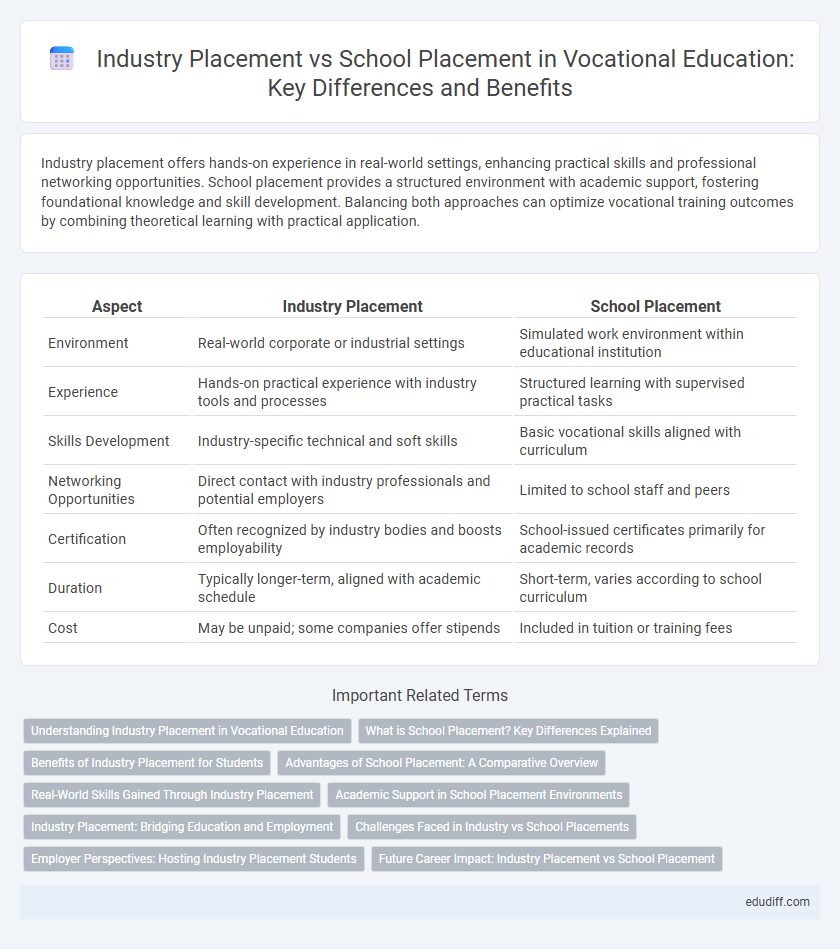Industry placement offers hands-on experience in real-world settings, enhancing practical skills and professional networking opportunities. School placement provides a structured environment with academic support, fostering foundational knowledge and skill development. Balancing both approaches can optimize vocational training outcomes by combining theoretical learning with practical application.
Table of Comparison
| Aspect | Industry Placement | School Placement |
|---|---|---|
| Environment | Real-world corporate or industrial settings | Simulated work environment within educational institution |
| Experience | Hands-on practical experience with industry tools and processes | Structured learning with supervised practical tasks |
| Skills Development | Industry-specific technical and soft skills | Basic vocational skills aligned with curriculum |
| Networking Opportunities | Direct contact with industry professionals and potential employers | Limited to school staff and peers |
| Certification | Often recognized by industry bodies and boosts employability | School-issued certificates primarily for academic records |
| Duration | Typically longer-term, aligned with academic schedule | Short-term, varies according to school curriculum |
| Cost | May be unpaid; some companies offer stipends | Included in tuition or training fees |
Understanding Industry Placement in Vocational Education
Industry placement in vocational education offers practical, hands-on experience within relevant workplaces, enhancing students' skills and employability much more effectively than traditional school-based placements. This immersive exposure aligns with actual industry standards and expectations, allowing students to build professional networks and gain firsthand insights into their chosen fields. Emphasizing industry placement bridges the gap between theoretical knowledge and real-world application, therefore significantly improving vocational training outcomes.
What is School Placement? Key Differences Explained
School placement involves students gaining practical experience within an educational institution, allowing them to apply theoretical knowledge in a controlled learning environment. Unlike industry placement, which immerses students in real-world business settings to develop professional skills and workplace adaptability, school placements focus on reinforcing curriculum content with supervised practice. Key differences include the setting, level of professional exposure, and the type of skills acquired, with school placements emphasizing academic integration and industry placements prioritizing career readiness.
Benefits of Industry Placement for Students
Industry placements provide students with hands-on experience in real-world work environments, enhancing practical skills and employability. Exposure to actual industry practices fosters professional networking opportunities and increases understanding of sector-specific demands. This immersive experience bridges the gap between academic knowledge and workplace expectations, significantly boosting career readiness.
Advantages of School Placement: A Comparative Overview
School placement offers structured learning environments with direct access to qualified instructors, enhancing theoretical understanding alongside practical skills. Students benefit from tailored support services and consistent feedback, promoting skill development at a personalized pace. The controlled setting ensures safety and a comprehensive curriculum aligned with vocational standards, often leading to better preparedness for industry demands.
Real-World Skills Gained Through Industry Placement
Industry placements provide students with direct exposure to professional environments, enhancing practical skills such as teamwork, problem-solving, and technical proficiency that school placements often lack. Real-world tasks completed during industry placements enable learners to apply theoretical knowledge and adapt to workplace demands effectively. Employers value industry placement experience as it demonstrates a candidate's readiness to contribute meaningfully from day one.
Academic Support in School Placement Environments
School placement environments provide structured academic support, including access to educators, tutoring services, and tailored learning resources that enhance skill development. Unlike industry placements, which emphasize practical work experience, school placements offer a balanced approach combining hands-on training with continuous academic guidance. This support framework helps vocational students achieve competency while meeting educational standards and qualifications.
Industry Placement: Bridging Education and Employment
Industry placement offers hands-on experience directly within professional environments, enhancing vocational skills and increasing employability rates among students. This practical exposure bridges the gap between theoretical knowledge gained in education and the real-world demands of the labor market. Companies engaging in industry placements benefit from fresh perspectives while students gain valuable networks, vocational knowledge, and job readiness.
Challenges Faced in Industry vs School Placements
Industry placements often present challenges such as adapting to fast-paced work environments, meeting professional standards, and managing real-world task complexities that exceed academic simulations. School placements typically struggle with limited exposure to practical scenarios and reliance on theoretical knowledge, which can hinder skill application in dynamic settings. Both placement types require different support systems to bridge the gap between learning and professional demands effectively.
Employer Perspectives: Hosting Industry Placement Students
Employers hosting industry placement students value hands-on skills development and real-world problem-solving abilities these students bring to the workplace. Industry placements offer companies tailored talent pipelines, allowing direct assessment of student capabilities and fit within organizational culture. Feedback indicates that students engaged in industry placements demonstrate higher adaptability and practical knowledge compared to those in traditional school placements.
Future Career Impact: Industry Placement vs School Placement
Industry placement offers hands-on experience with current technologies and practices, significantly enhancing employability and career advancement opportunities compared to school placement. Exposure to real-world industry challenges develops critical problem-solving skills and professional networks that are crucial for future career growth. School placement, while valuable for foundational learning, often lacks the practical application and industry-specific insights needed to secure competitive positions in the job market.
Industry placement vs School placement Infographic

 edudiff.com
edudiff.com